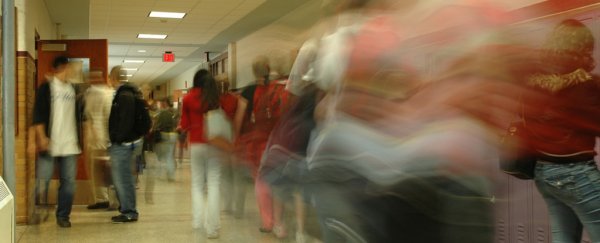A broad study of middle and high school science teachers in the US has found that the teaching of climate change in American schools is severely lacking.
In what the researchers claim is the first nationally representative survey of American science teachers on climate change education, data was collected from 1,500 public school teachers spread across all 50 US states. The findings suggest that climate change denial is being taught in a significant proportion of the nation's classrooms, and that many teachers who do try to address human-caused global warming don't have the time or resources to educate students properly about the science involved.
"At least one in three teachers bring climate change denial into the classroom, claiming that many scientists believe climate change is not caused by humans," said Josh Rosenau, programs and policy director at the National Centre for Science Education. "Worse, half of the surveyed teachers have allowed students to discuss the supposed 'controversy' over climate change without guiding students to the scientifically supported conclusion."
The research, which is published in Science, suggests that the amount of climate change education children receive is extremely small, amounting to just 1 or 2 hours of lessons over the course of an entire school year.
"Not as much as we had hoped, and not enough to provide students a solid grounding in the science," said political scientist Eric Plutzer from Penn State University, who designed the survey. "The good news? Few teachers were pressured to avoid teaching about global warming and its causes."
Nonetheless, the sub-par teaching is clearly a systemic problem. Three out of five teachers surveyed were unaware of or misinformed about the near-total extent of scientific consensus on climate change. Fortunately, there's also firm evidence of the educational community wanting to improve their knowledge, even among many of those who might now be identified as climate skeptics.
"There are some great climate education resources out there, [but] many teachers don't have time to find and evaluate these materials," said one of the researchers, Minda Berbeco. "It's clear that the vast majority of surveyed teachers are hungry for additional professional development. Even half the teachers who deny the scientific consensus on climate change say they would take this training."
But it's not just about keeping scientific knowledge up to date, either. The researchers note that one of the survey's questions measuring the teacher's political ideology was a more powerful predictor of their approach in the classroom than any of the survey measures related to education or scientific knowledge. This suggests values around the teaching of climate science – from a neutral, depoliticised perspective – also need to be addressed.
That said, the authors of the study are at pains to get teachers on board with their findings, and not trying to unfairly peg them as the sole problem here.
"Teachers didn't create the polarised culture war around climate change," said Rosenau, "but they're the key to ending this battle."
